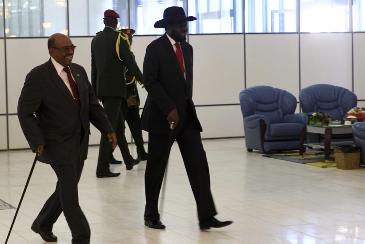Kiir, Bashir discuss ways to protect South Sudan’s oilfields
April 5, 2014 (KHARTOUM) – South Sudan’s president Salva Kiir concluded a one-day visit to Khartoum on Saturday during which he discussed with his Sudanese counterpart Omer Hassan Al-Bashir bilateral relations and security issues.

An official source told Sudan Tribune that Kiir asked for Khartoum’s support through tightening control along the borderline between the two countries, adding that both sides also discussed ways for protecting oilfields against potential attacks by South Sudan rebels.
The same source also said Juba asked Khartoum to back its stances within the East African regional block IGAD with regard to participation of the seven detained SPLM leaders in the negotiations between the government and the rebels.
South Sudan’s deadly conflict erupted last December after clashes broke out between rival factions of the presidential guards in Juba when the president ordered the disarmament of Nuer soldiers in the guards division, triggering the subsequent violence.
Kiir, however, said he was responding to an alleged coup plot by his former long-time deputy Riek Machar, but the latter accused Kiir of instigating the violence in order to get rid of his political opponents within the ruling party.
Machar has maintained that he was forced into “armed resistance”, accusing president Kiir of “dictatorial tendencies” and calling on him to step down.
Over 10,000 people have reportedly been killed and nearly a million displaced since violence erupted, according to UN estimates.
While Machar escaped from Juba with former Unity state governor Taban Deng Gai, when the fighting began, 11 senior SPLM members were arrested and accused of being behind an alleged coup attempt in the country.
After international pressure and a ceasefire deal signed on January 23rd, Juba released seven of the detainees but kept four, including the SPLM’s former secretary general Pagan Amum in custody.
Bashir said in a joint press conference with Kiir that they discussed ways for developing bilateral ties through implementation of cooperation agreements, adding they also discussed security situation in the two countries and agreed to coordinate efforts to achieve security and stability.
He pointed that the visit comes within the framework of the continued consultations between the leadership in both countries in order to strengthen relations, expressing hope that ties between the two countries would be fully normalised and borders opened for the benefit of the two peoples.
Kiir for his part expressed satisfaction at the visit to Khartoum, noting that the visit was supposed to take place after Bashir’s recent visit to Juba but was delayed due to security developments in South Sudan.
He said they agreed to set up mechanisms to reactivate implementation of the joint cooperation agreement signed between the countries in Addis Ababa.
In September 2012, both Sudan and South Sudan signed a series of cooperation agreements, which covered oil, citizenship rights, security issues, banking, border trade among others.
In March 2013, the two countries signed an implementation matrix for these cooperation agreements.
Kiir thanked Khartoum for receiving around 30,000 southern refugees who fled the ongoing conflict in South Sudan.
Meanwhile, Sudan’s ambassador to Juba, Mutrif Sideeg, denied that South Sudan demanded participation of Sudanese troops in the African forces in South Sudan instead of Ugandan ones.
He stressed in press statements in Khartoum on Saturday that talks of the two presidents did not discuss formation of joint force to protect oilfields in South Sudan.
“They didn’t discuss anything in this regard and there is no agreement of this kind”, he added.
Sideeg further announced that South Sudan’s defence minister will visit Khartoum next week to continue discussions he started last month with security officials in Khartoum besides determining the baseline for the demilitarised security zone (zero line) and the 10 border crossings.
(ST)
